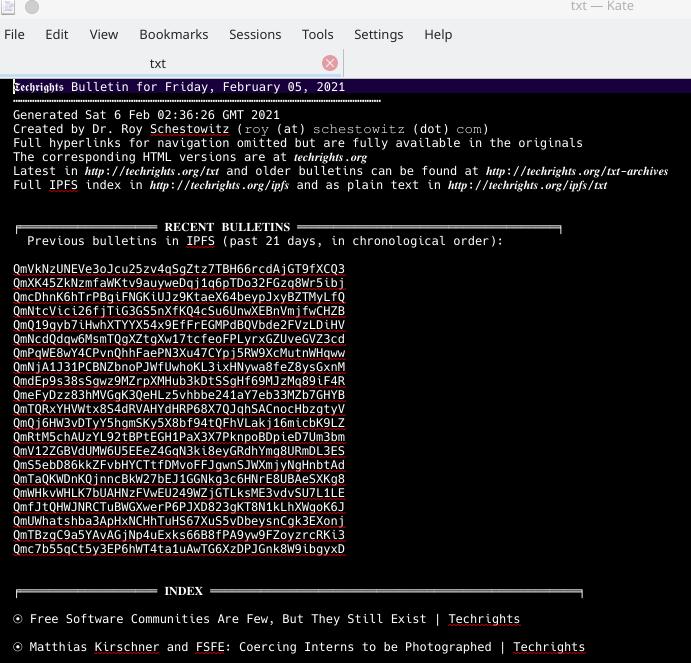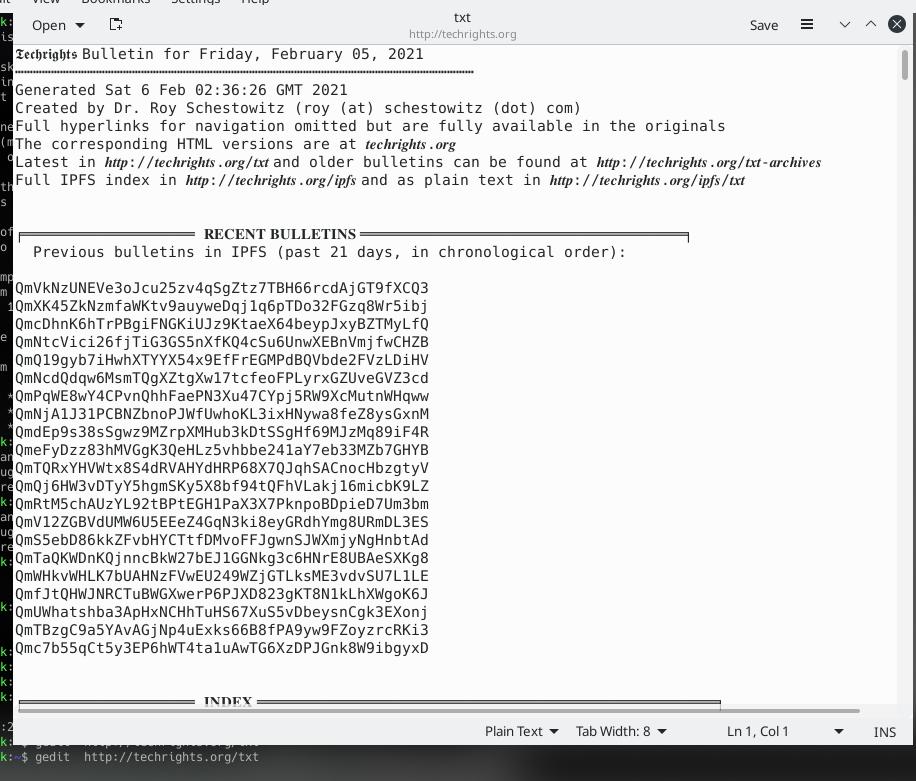

SINCE OCTOBER of last year Techrights has been fully and entirely available as text files. We're programmers by trade (most of us), so it's not a big task. Over time we further refined a number of things in order to enhance clarity, automate generation, 'upload' (the technical term is add) everything to IPFS automatically 'in the background' (making copies or placing mirrors of the objects in several countries around the planet) and so on. It's periodically updated around 3 AM every morning (British time). It's almost the quietest time of the day.
"Each time we bypass the Web to receive information (or at least bypass browsers) we exercise some level of liberty and if enough of us do it, change for the better will happen."A lot of people quite likely ignore everything we've said about IPFS ("it's not for me" and "I don't care!") and prefer HTTP/HTML because unlike text file it contains images and other stuff. But let's face it; much clutter can be avoided by reading news from one's text editor or command like. Speaking for myself, I read most of the news in my text editor, Kate, which imports from RSS feeds and prepares neat summaries, sorted chronologically and logically. It's the only feasible way to 'consume' a lot of information and keep abreast of world affairs.
For Techrights, unlike with most sites, the process is greatly simplified because we're making the conversions at our end, every night, and then generate complete daily bulletins.
Assuming you are using a UNIX-like system (BSD, GNU/Linux and even MacOS), it ought to be very simple to set up the machine for reading the site without a Web browser, only an Internet connection and a text editor, either command line (lynx, curl, wget etc.) or a graphical user interface. As the bulletins are generated overnight at roughly the same (predictable) time it's also possible to set up cron jobs and automate the fetching process. Here's an example
$ crontab -l
05 04 * * * DISPLAY=:0.0 kate http://techrights.org/txt 05 04 * * * DISPLAY=:0.0 falkon http://techrights.org/ipfs
falkon http://techrights.org/ipfs/txt (or "firefox" instead of "falkon" if you prefer that browser). Of course kate http://techrights.org/ipfs/txt is also a possibility because it's just a plain text file. Some people prefer fetching this index and then processing it from the command line, e.g. ipfs cat [some latest CID/s]. We've formatted the file for easy consumption from the command line. This file is being updated and kept complete 3 times per day.
crontab -e will let you edit the list of cron jobs in order to add something like the above. It may depend on what programs you prefer, what times of the day suit you, and what operating system is used (Wayland was never tested, but this ought to work with systemd too).
0 09 * * * DISPLAY=:0.0 gedit http://techrights.org/txt 30 10 * * * DISPLAY=:0.0 gedit http://techrights.org/ipfs/txt
 The Bloat Wide Web (WWW) has been a boon to the surveillance industry. Even many Web browsers are nowadays just spying on the users on behalf of browsers owners. It's their business model. Each time we bypass the Web to receive information (or at least bypass browsers) we exercise some level of liberty and if enough of us do it, change for the better will happen. The same is true to some degree when it comes to RSS feeds, as opposed to social control media and mind-reading 'search' engines.
The Bloat Wide Web (WWW) has been a boon to the surveillance industry. Even many Web browsers are nowadays just spying on the users on behalf of browsers owners. It's their business model. Each time we bypass the Web to receive information (or at least bypass browsers) we exercise some level of liberty and if enough of us do it, change for the better will happen. The same is true to some degree when it comes to RSS feeds, as opposed to social control media and mind-reading 'search' engines.
If Techrights can be served in a decentralised fashion and in lightweight form, it'll ease the strain on our server, which has just come under ma assive DDOS attack (literally while I was typing this post). We're growing over time and we want to ensure that access to the site will be preserved (along with free speech, which a social control media oligopoly is eager to suppress). ⬆